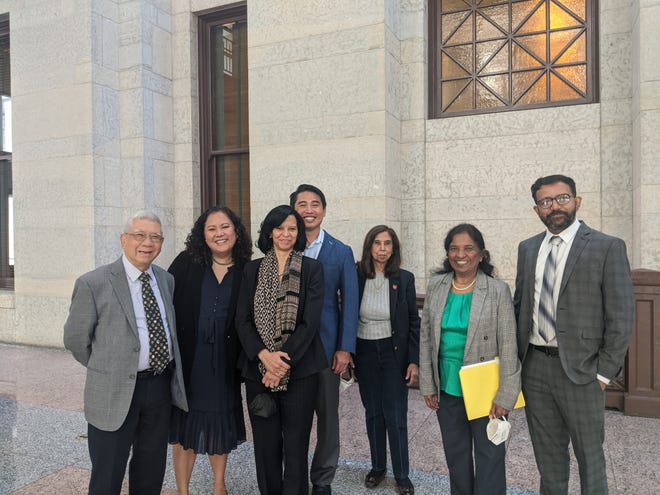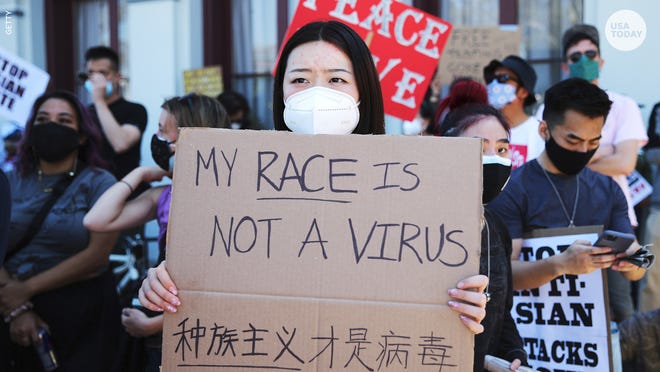With rise in anti-Asian harassment, efforts renewed to establish Ohio AAPI Commission
The idea still faces high hurdles as legislative leaders shot it down in state budget discussions.

Asian Americans and Pacific Islanders (AAPIs) are the only ethnic group in Ohio without a state-level commission.
Ohio's AAPI leaders have been trying to change that for more than a decade. But with this year's Atlanta shooting and a rise in anti-Asian hate incidents stemming from the COVID-19 pandemic, advocates have renewed their push to create the Ohio AAPI Commission.
"I think sadly, the result of what happened in Atlanta is that people have been willing to listen more. Legislators were more willing to meet with us," said Jona Hilario, the co-director of OPAWL, a statewide feminist AAPI group. "The conditions that led to Atlanta exist everywhere else. We shouldn't be waiting for another Atlanta to happen to do something."
Despite that momentum, a commission has yet to materialize. But advocates are organizing behind separate bills in the Ohio Statehouse to establish the commission.
A decade-long effort
Asian Americans used to somewhat have a voice at the state government level before through the Ohio AAPI Advisory Council.
Established in 2010 under former Democratic Gov. Ted Strickland, the council was not the commission he promised in 2007 but a product of continued insistence, said Yung-Chen Lu, who chaired the council.
Lu was told a commission wasn't granted because there was no budget for it. The advisory council, however, cost little to nothing.
Work by the council members was done on a volunteer basis. The council was financially limited in what it could do, so creating a commission was one of the council's first goals.
"We cannot even establish a [financial] account in the state government," Lu said. "It is deeply felt that we don't have enough manpower and resources to do what we would like to accomplish."
For many years, and especially during the pandemic, Asian American grassroots organizers have served the community through efforts, such as translating COVID-19 material and by holding community discussions on the rise of hate crimes.
Lu said community services have been volunteer-powered or backed by contributions raised through events like the Asian Festival.
Former Republican Gov. John Kasich renewed the advisory council, but Gov. Mike DeWine did not when he took office in 2019.
The advisory council is now defunct. Lu and others don't understand why, especially since it doesn't cost anything.
Advocates said not having any body of representation hurts. At least with the advisory council, there was ongoing, formal communication between state agencies and the AAPI community.
The governor's office, when asked why it was discontinued, pointed to Asian American representation in other ways.
"The DeWine administration has made it a priority to give members of Ohio’s Asian American Pacific Islander community, and other ethnic and racial minority groups a more impactful, comprehensive voice across the state by integrating them into existing boards, commissions, agencies and departments that reach across all facets of state government," said spokesperson Breann González Almos.
But the past couple of years have seen some breakthrough. In 2019, for the first time, a bill was introduced to create the Ohio AAPI Commission, championed by Sen. Tina Maharath, D-Canal Winchester, the state's first Asian American female lawmaker.
The importance of a commission
The number of Asian American and Pacific Islanders in Ohio is growing rapidly, emphasizing the need for a commission, said advocates. Per 2019 counts from the US Census, just 2.6% of Ohioans are AAPI, but AAPIs are the fastest-growing group in Ohio, having at least doubled their numbers since 2000.
One of the biggest benefits would be funding and staffing to support ongoing initiatives in the AAPI community. Asian American leaders are asking for around $450,000 per fiscal year, which Hilario thinks is minimal compared to other priorities in the state budget.
But beyond the money, the commission would be able to gather data, raise awareness on issues and secure resources for the AAPI community.
Lalitha Pamidigantam, a policy analyst at YWCA Columbus, said it's difficult to do policy work without the sort of data the commission would help provide.
"I think there is a lot of erasure when it comes to Asian Americans and the violence Asian Americans face," Pamidigantam, who testified in favor of the commission, said. "Having a commission that can focus on and highlight issues can really help us."
Maharath said the commission would act as a middleman between the AAPI community and the government beyond communicating information, such as by providing cultural competency training to police departments on how to speak to victims of anti-Asian hate incidents.
Otherwise, Asian Americans and Pacific Islanders won't be treated as its own distinct group as it deserves, she said.
"If we need any help, they're going to tell us to go to other organizations," the senator said.
It also sends an important message to AAPI community members that they matter, said advocates, especially during a time when Asian Americans feel unsafe.

Hilario said an Ohio budget has never mentioned the AAPI community. There is no mention of Asian Americans or Pacific Islanders in any version of this year's budget, from its introduction to the final 3,300-page document signed July 1 by DeWine.
"Budgets are moral documents," Hilario said. "What do you value shows up in your budget and what you don't value is absent. If our community was important to our leaders, you would find us in the budget."
Why it was shot down and what's next
Advocates were initially optimistic about the inclusion of the commission in the budget after several lawmakers expressed sympathy and understanding with them. That never happened.
State Sen. Niraj Antani, R-Miamisburg, Ohio's first Indian-American senator who also requested the AAPI commission, said any amendment that costs taxpayer resources is a difficult sell.
However, Maharath said she was told that GOP lawmakers didn't want any "race-based issues" in the budget bill. She doesn't completely buy that given the budget designated Juneteenth a state holiday.
A spokesperson for Senate Republicans would not confirm whether that was the reason, but said many amendments do not make it into the budget and must work their way through the normal legislative process.
Maharath also sent a letter to DeWine last summer to ask him to create the Ohio AAPI Commission through executive order. Maharath said she was told her request was denied because the executive branch was focused on handling COVID-19: "They're not really demonstrating the urgencies or the need to address Asian American Pacific Islander issues."

DeWine's office disagreed, pointing again to its inclusion of Asian Americans and Pacific Islanders across various governmental bodies.
The path forward now is through Maharath's bill, which Antani is also sponsoring. A companion bill in the Ohio House was also introduced.
Maharath hopes she can at least get the legislation passed out of either the House or Senate.
"I am optimistic that we'll see a bit more progress with legislation this time around, especially since both chambers introduced the bill pretty early on," she said. "Especially with the rise in hate crimes... this is more reason that we need it now than ever."
Grace Deng and Titus Wu report for the USA TODAY Network Ohio Bureau, which serves the Columbus Dispatch, Cincinnati Enquirer, Akron Beacon Journal and 18 other affiliated news organizations across Ohio.